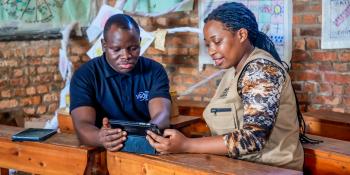Fishing was once easy in Cambodia’s Great Lake, Tonle Sap, with abundant fish and little competition. That’s no longer the case, meaning a VSO project to improve incomes was timely – and welcome.
Tat Cheng, 63, lives in Kampong Os, a village on the shores of the Tonle Sap. Fed by the mighty Mekong river, it’s the largest body of fresh water in Southeast Asia, with fisheries among the largest and most biodiverse in the world.
But that’s now changing; over-fishing, extensive damming and climate change all mean there are fewer fish to go around and many people are forced to find alternative work. The young, as in Kampong Os, are leaving their homes and find work in distant Phnom Penh or even further afield.
Because of a lack of fish and water, young people have to look for work in different places, such as Phnom Penh. The majority of the villagers here are elderly.
Tat Cheng
The family of Yu Saret, subsistence farmer in the same village, illustrates the changing demography. Saret, who is 53 and widowed, says that every one of her seven children has left the village; two work on farms in South Korea, the rest on construction sites and in garment factories.
“My children decided to go find a job someplace else,” she says, “because there is no more work for them to do here.”
Preserving and protecting
A recent VSO project in two provinces, Kampong Thom and Kampong Chhnang, aimed to help those living on the shores of the lake, seeking to boost incomes, protect fish stocks and provide alternative livelihoods.
Some achievements are easy to see. Tat Cheng now spends part of his time patrolling the community conservation area in a boat with others from his village. They prevent illegal fishing and seize illegal nets in their area, helping limit the destruction of the lake’s once wildly abundant fish stocks.
Finding alternatives
In the face of such uncertainty, it’s safest to have diverse sources of income. But when fishing or farming is all you’ve ever known, the learning curve can be steep and costly. To help smooth the transition, the project supported more than 1,200 people, the vast majority women, to access the credit they need to invest in alternative livelihoods.
It’s far from a solution for the problems of all those living around the lake. Fish stocks will take decades to recover, while global climate change is set to have a huge impact on this fragile ecosystem.
But for the fishermen and farmers who’ve been involved in the VSO project, it has provided a measurable improvement in their lives; 85% have seen incomes improve by more than 20% – a rise that might even tempt some younger Cambodians to return to their homes along the Tonle Sap.
Read more

Using play to inspire learning in Rwanda
Learn how volunteers like Celestin are supporting children in Rwanda to learn through play. Children are taught problem solving, strategic thinking and inter-personal skills, all while enjoying the learning process.
Three ways we’re supporting local, eco-friendly business practices in Cambodia
On the Tonle Sap Lake, climate change, overfishing, deforestation, and the depositing of untreated industrial and domestic sewage, are all threatening the natural balance of the region. VSO has supported local people to adapt to this environment by developing green business practices.

The two volunteers empowering girls and young women in Mozambique
Nelma and Carmirene and are two volunteers working on VSO's EAGLE project in Mozambique. For Nelma and Carmirene, education is not just about school, it is about meeting people where they are and using the right tools to challenging harmful norms. Here are their stories.
